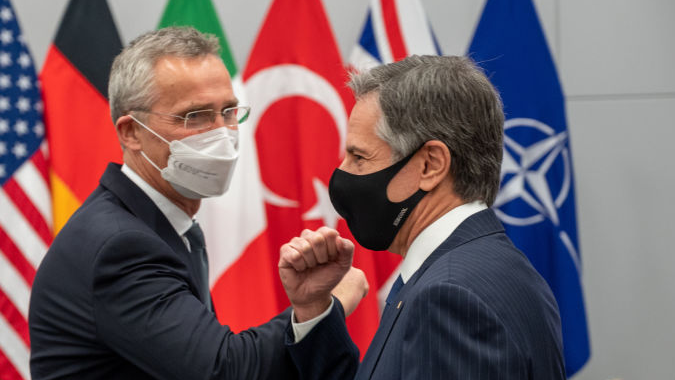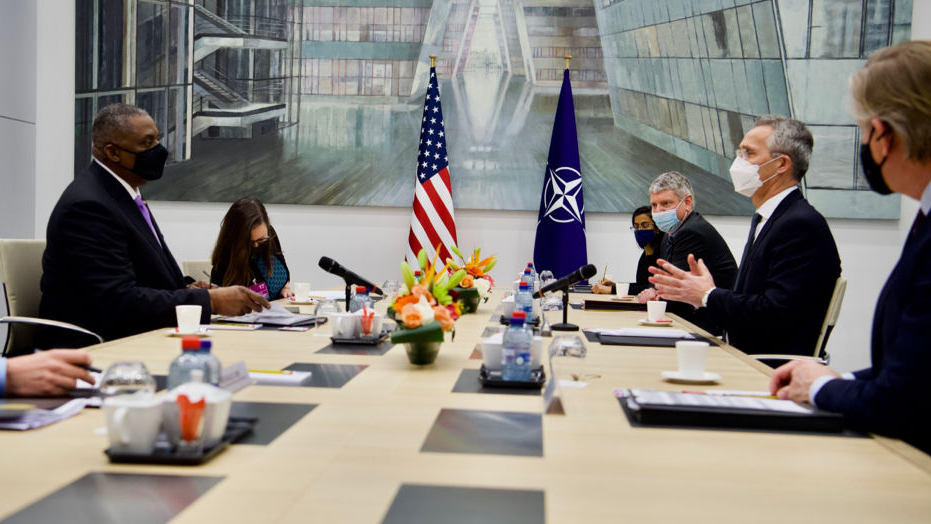
U.S. Secretary of State Antony Blinken (R) and Secretary General of NATO Jens Stoltenberg (L) are seen as they attend the Narrow Participation Council Meeting of NATO Resolute Support Mission Framework Countries NATO Council Meeting on Afghanistan, organized with the participation of foreign and defense ministers in Brussels, Belgium, April 14, 2021. /Getty
U.S. Secretary of State Antony Blinken (R) and Secretary General of NATO Jens Stoltenberg (L) are seen as they attend the Narrow Participation Council Meeting of NATO Resolute Support Mission Framework Countries NATO Council Meeting on Afghanistan, organized with the participation of foreign and defense ministers in Brussels, Belgium, April 14, 2021. /Getty
Editor's note: Azhar Azam works in a private organization as market & business analyst and writes about geopolitical issues and regional conflicts. The article reflects the author's opinions and not necessarily the views of CGTN.
Notwithstanding decades-old disagreements and differences from the Suez crisis in 1956 and French withdrawal from military cooperation in 1960 North Atlantic Treaty Organization (NATO) coalition Secretary General Jens Stoltenberg is trying to represent the "brain-dead" grouping as a stronger political alliance after Stoltenberg flagged China's assertive moves such as coercing neighbors in the region and hampering freedom of navigation in the South China Sea.
The idea to develop NATO into a reinforced alliance was brought to light when the bloc had quietly lost relevance at the international stage and desperate efforts were required to boost its significance. Stoltenberg's creation of Reflection Group in March 2020, to determine how alliance can strengthen its political role, adduced the very same thing.
The remotely-conducted reflection process emphasized that NATO should deepen consultation and cooperation with nations in the Asia Pacific such as Australia, Japan, New Zealand and South Korea to cope with China's rise through NATO+4 Format or other channels. It further recalled political adaption was in the lifeblood of NATO and had become a baseline requirement of its survival.
Even though NATO countries acknowledge the importance of the Asia Pacific as a crucial and dynamic region of the world, collaboration between alliance and Pacific countries doesn't seem plausible any time soon as there is no agreement among allies on priority of the Asia Pacific to NATO or of its "Asia-Pacific partners" specifically.
The lack of consensus within NATO that handcuffs American sick goal to destabilize region, the key Pacific states are also publicly snubbing the temptation to join any U.S.-led initiative such as the Quad that "excludes or contains a particular country," indicating they remain diffident to frame any bilateral relationship against any nation.
NATO chief has been harping on a stronger political alliance and Asia Pacific, hoping it would help the organization reverse the declining relevance. The experts concur the 30-member alliance could soon turn irrelevant as it lacks strategic focus with club members cannot agree on a clear and definite purpose, resulting in a mission creep.
On the onset of the second decade of 21st century, even NATO's top command felt that the organization was fragmenting badly. In order to protect itself from further internal bleeding and demonstrate alliance's solidity, the alliance started carrying out counter-terrorism and anti-piracy operations in Iraq, Libya, Syria and the Horn of Africa through formal and informal alliances.
These abortive and controversial operations boomeranged and tanked the popularity and political cohesion of an organization whose brutal history was summed up by first NATO Secretary General Lord Ismay, "to keep the Russians out, the Americans in and the Germans down."

United States Secretary of Defence, Lloyd Austin (L) meets Secretary General of NATO, Jens Stoltenberg (R) as they arrive to attend the meeting of foreign and defense ministers on Afghanistan, at NATO's headquarters in Brussels, Belgium, April 14, 2021. /Getty
United States Secretary of Defence, Lloyd Austin (L) meets Secretary General of NATO, Jens Stoltenberg (R) as they arrive to attend the meeting of foreign and defense ministers on Afghanistan, at NATO's headquarters in Brussels, Belgium, April 14, 2021. /Getty
After the U.S. invaded Afghanistan in 2001, NATO for the first and only time invoked Article 5, which declares an attack on one is attack on all. But the principle to protect each other couldn’t be translated into practice as some allied governments prevented their troops from conducting night missions or stopped their deployment in violent parts of Afghanistan.
The NATO-led International Security Assistance Force (ISAF) consequently was mocked as "I Saw Americans Fight" or "I Sunbathed at (heavily protected and largely safe) FOBs (forward operating bases)" and failed to achieve its single objective, defeating Taliban and destroying al-Qaeda, as insurgents strengthen their foothold in Afghanistan while Americans meet demands of the militants it overthrew 20 years ago and al-Qaeda, Islamic State and other militant groups haven't disappeared from the country.
In addition to a sense of serving the U.S. interests for many decades and America's quiet shift from Europe to Asia, the transatlantic consensus is also complicated by internal divisions on China and halting and uneven European economic recovery. The splits would worsen in coming months as the Biden administration ignores Europe's economic woes and expects allies to hit defense spending to 2 percent of GDP even though they have contributed more funds in the pandemic.
Washington has been mounting pressure on Europe to jeopardize its economic interests with Beijing. The European countries including numerous NATO allies would balk at such a terrible idea that would break them up from the powerhouse of global growth, trade and investment and a valuable partner holding key to thwart global challenges such as climate change and biodiversity and achieve the UN Sustainable Development Goals.
With Belt and Road Initiative (BRI) and 17+1 cooperation between China and Central and Eastern European Countries steadily expanding in European peninsula – the global economic and infrastructure relationship leading economies will rebalance international order and bring more stability to world, urging NATO as an alliance to revisit its approach toward China and look Chinese growth with a positive attitude.
Realizing China's importance for European economic revival, the U.S. Secretary of State Antony Blinken promised not to force allies to choose between China and the United States. But his second visit in three weeks and Defense Secretary Lloyd Austin's inaugural trip to Europe to revitalize the transatlantic relationship and gain support on Iran, Russia and number-one "pacing challenge," China, underscored the NATO European allies are under full-court press of the Biden administration.
The pressure tactics and pandemic-hit Europe's economic and health crisis will only unearth divergence and divisions within the bloc, becoming altogether a source of bickering between U.S. and its European allies. These disagreements have enervated the transatlantic relationship in the past under Trump's four years and would continue to decimate NATO's relevance in the future.
(If you want to contribute and have specific expertise, please contact us at opinions@cgtn.com.)

